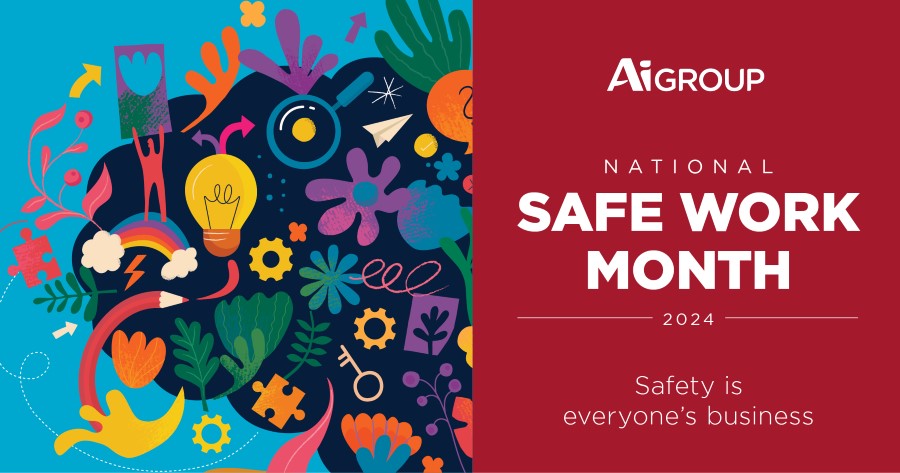
Do you have measures in place to identify and manage issues that could harm workers’ mental health?
The spotlight is on psychological health and safety this week, as part of National Safe Work Month and also Mental Health Month.
Organisations have a duty of care to support workers’ health by managing psychosocial hazards in the workplace and promoting psychological wellbeing.
There are 14 psychosocial hazards including:
“Including psychological health in a safety strategy and managing psychosocial risks not only protects workers but improves organisational culture and productivity, so the organisation can achieve continuous improvement in the workplace,” says Ai Group WHS Adviser - WHS Consulting Services Kirsty Mungly.
Safe Work Australia’s National Safe Work Month, which has a theme of “Safety Is Everyone’s Business” this year, encourages individuals and organisations to prioritise work health and safety (WHS) and take preventative action to reduce the number of work-related injuries, illnesses and fatalities.
Safe Work Australia says 200 workers in Australia were fatally injured at work and 139,000 serious workers’ compensation claims were made last year.
“There has been an increased focus by businesses and organisations to identify and manage psychosocial hazards since the Australian Human Rights Commission (AHRC) enforced a positive duty on employers in December last year,” Ms Mungly said.
“We're also seeing a substantial increase in the number of workers’ compensation claims being raised around mental health.
“Unfortunately, it takes people a significant amount of time to come back to the workplace following a psychological claim. It’s not like a physical injury; recovery is conditional on a lot of factors.”
Legislative requirements around psychosocial hazards mean employers must consult with their workers to identify hazards and put in place measures to address these concerns.
“This is where a risk assessment comes in,” Ms Mungly said.
"Sometimes employers find it easy to identify the hazards after talking to their workers, but to manage the risks appropriately, a risk assessment is needed to ensure the right risk controls are put in place.
"This risk assessment process is more difficult and complex than with physical hazards, because psychosocial hazards interact and combine.
“Our WHS consultants help you identify risks specific to your organisation through engaging workers in workshops and employee surveys, which tend to reveal massive gaps between what organisations think they're doing and reality.
“The risk assessment process culminates in a plan which can assist the business to implement and share the agreed actions to improve psychological safety in the workplace.
“It’s not a set-and-forget activity.”
The psychosocial hazard that tends to rank highest in risk assessments relates to job demands (workload management), Ai Group WHS consultants have found.
“This often arises following an organisational restructure during which the employer fails to carry out meaningful consultation, and fewer people are left doing the same work,” Ms Mungly said.
“Simply informing employees of a restructure is not ‘consultation’.
“In this situation, you’ve got to navigate possible subsequent issues such as understaffing and workload redistribution.”
Inadequate reward and recognition also ranks highly when it comes to identifying psychosocial hazards in the workplace.
“All these psychosocial hazards overlap to create an increased level of risk in organisations with a poor workplace culture,” Ms Mungly said.
“Conversely, having steps and systems in place to look at how work is designed and structured that includes involving workers will prevent psychosocial hazards in the first place. It will do so much to promote a positive culture.”
Ai Group WHS consultants have developed and released a new video and facilitator guide, Toolbox Talk: Recognition (From Thank You to Thriving: Building a Recognition Driven Workplace), to help managers and supervisors talk to their teams about ways to improve how people are recognised for great work in the workplace.
For further assistance with managing psychosocial hazards in your workplace, please contact Ai Group's WHS Consulting Service.

Wendy Larter is Communications Manager at the Australian Industry Group. She has more than 20 years’ experience as a reporter, features writer, contributor and sub-editor for newspapers and magazines including The Courier-Mail in Brisbane and Metro, the News of the World, The Times and Elle in the UK.